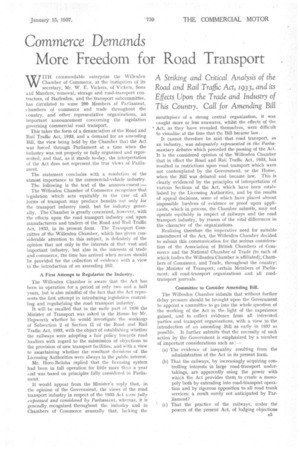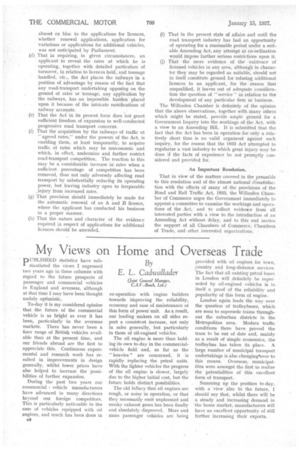Commerce Demands
Page 39

Page 40

If you've noticed an error in this article please click here to report it so we can fix it.
More Freedom for Road Transport A Striking and .Critical Analysis of the Road and Rail Traffic Act, .1g33, and its Effects Upon the Trade and industry of This Country. Call for Amending Bill WITH commendable enterprise the Willesden Chamber of Commerce, at the instigation of its secretary, Mr. W. E. Vickers, of Vickers, Sons and Manders, removal, storage and road-transport contractors, of Harlesden, and the transport subcommittee, has circulated to some 200 Members of Parliament, chambers of commerce and trade throughout the
• country, and other representative organizations, an important announcement concerning the legislation governing commercial road transport.
This takes the form of a denunciation of the Road and Rail Traffic Act, 1933, and a demand for an amending Bill, the view being held by the Chamber that the Act was forced through Parliament at a time when the industry was not properly or fully organized and represented, and that, as it stands to-day, the interpretation of the Act does not represent the true views of Parliament.
The statement concludes with a resolution of the utmost importance to the commercial-vehicle industry.
The following is the text of the announcement :
The Willesden Chamber of Commerce recognizes that legislation which acts equitably in the case of all forms of transport may produce benefits not only for the transport industry itself, but for industry generally. The Chamber is greatly concerned, however, with the effects upon the road transport industry and upon manufacturers and traders of the Road and Rail Traffic Act, 1933, in its present form. The Transport Committee of the Willesden Chamber, which has given considerable attention -to this subject, is definitely of the opinion that not only in the interests of that vast and important industry, but also in the interests of trade and commerce, the time has arrived when means should be provided for the collection of evidence with a view to the introduction of an amending Bill.
A First Attempt to Regularize the Industry.
The Willesden Chamber is aware that the Act has been in operation for a period of only two and a half years, but is also mindful of the fact that the Act represents the first attempt in introducing legislation controlling and regularizing the road transport industry. .
It will be recalled that in the early part of 1936 the Minister of Transport was asked in the House by Mr. Hepworth whether he would investigate the workings of Subsection 2 of Section II of the Road and Rail Traffic Act, 1933, with the object of establishing whether the railways were adopting a fair policy towards road hauliers with regard to the submission of objections to the provision of new transport facilities, and with a view to ascertaining whether the resultant decisions of the Licensing Authorities were always in the public interest.
Mr. Hore-Belisha replied that the licensing system had been in full operation for little more than a 'year and was based on principles fully considered in Parlia ment. .
It would appear from the Minister's teply that, in the opinion of the Government, the views of the road transport industry in respect of the 1933 Act were pally expressed and considered by Parliament, whereas, it is generally recognized throughout the industry and in Chambers of Commerce generally that, lacking the mouthpiece of a strong central organization, it was caught more or less unawares, whilst the effects of the Act, as they have revealed themselves, were difficult to visualize at the time that the Bill became law.
It cannot therefore be said that road transport, as an industry, was adequately represented in the Parliamentary debates which preceded the passing of the Act. It is the considered opinion of the Willesden Chamber that in effect the Road and Rail Traffic Act, 1933, has resulted in restrictions upon road transport which were not contemplated by the Government, or the I4ouse, when the Bill was debated and became law. This is clearly evidenced by the principles of interpretation of various Sections of the Act, which have been established by the Licensing Authorities, and by the results of appeal decisions, some of which have placed almost impossible burdens of evidence or proof upon applicants, which in process, the Chamber submits, may not operate equitably in respect of railways and the road transport industry, by reason of the vital differences in the character of the organizations.
Realizing therefore the imperative need for suitable amendment of the Act, the Willesden Chamber decided to submit this communication for the serious consideration of the Association of British Chambers of Commerce and the National Chamber of Trade (to each of which bodies the Willesden Chamber is affiliated); Chambers of Commerce, and Trade, throughout the country; the Minister of Transport; certain Members of Parliament; all road-transport organizations and all roadtransport journals.
Committee to Consider Amending Bill.
The Willesden Chamber submits that without further delay pressure should be brought upon the Government to appoint a committee to go. into the whole question of the working of the Act in the light of the experience gained, and to collect evidence from all interested parties and transport organizations, with a view to the introduction of an amending Bill as early in 1937 as possible. It further submits that the necessity of such action by the Government is emphasized by a number of important considerations such as :—
(a) The evidence of inequality resulting from the administration of the Act in its present form.
(b) That the railways, by increasingly acquiring controlling interests in large road-transport undertakings, are apparently using the power with which the Act provides them, to create a monopoly both by extending into road-transport operation and by rigorous opposition to all road trunk services; a result surely not anticipated by Parliament?
That the practice of the railways, under the powers of the -present Act, of lodging objections s5
almost en bloc to the applications for licences, whether renewal applications, application for variations or applications for additional vehicles, was not anticipated by Parliament.
(d) That in requiring, in given circumstances, an applicant to reveal the rates at which he is operating, together with detailed particulars of turnover, in relation to licences held, and tonnage handled, etc., the Act places the railways in a position of advantage by reason of the fact that any road-transport undertaking opposing on the ground of rates or tonnage, any application by the railways, has an impossible burden placed upon it because of the intricate ramifications of railway accounts.
(e) That the Act in its present form does not grant sufficient freedom of expansion to well-conducted progressive road transport concerns.
(1) That the acquisition by the railways of traffic at "agreed rates," under the powers of the Act, is enabling them, at least temporarily, to acquire traffic at rates which may be uneconomic and which, in effect, undermine and further restrict road-transport competition. The reaction to this may be a considerable increase in rates when a sufficient percentage of competition has been removed, thus not only adversely affecting road transport by substantially reducing its operating power, but leaving industry open to irreparable _injury from increased rates.
(g) That provision should immediately be made for the automatic renewal of an A and B licence, where the applicant has conducted his business in a proper manner.
(h) That the nature and character of the evidence required in respect of applications for additional licences should be amended. That in the present state of affairs and until the road transport industry has had an opportunity of operating for a reasonable period under a suitable Amending Act, any attempt at co-ordination would impose further serious restrictions upon it.
That the mere evidence of the existence of licensed vehicles in any area, although in charac ter they may be regarded as suitable, should not in itself constitute ground for refusing additional licences to an applicant, for the reason that unqualified, it leaves out of adequate considera tion the question of " service " in relation to the development of any particular firm or business.
The Willesden Chamber is definitely of the opinion that the above observations, together with many others which might be stated, provide ample ground for a Government Inquiry into the workings of the Act, with a view to an Amending Bill, It is submitted that the fact that the Act has been in operation for only a relatively short time is no valid argument against such inquiry, for the reason that the 1933 Act attempted to regularize a vast industry to which great injury may be done if the facts of experience be not promptly considered and provided for.
An Important Resolution.
That in view of the matters covered in the preamble to this resolution and of the almost national dissatisfaction with the effects of many of the provisions of the Road and Rail Traffic Act, 1933, the Willesden Chamber of Commerce urges the Government immediately to appoint a committee to examine the workings and operations of the Act, and to collect evidence from all interested parties with a view to the introduction of an Amending Act without delay, and to this end invites the support of all Chambers of Commerce, Chambers of Trade, and other interested organizations.




















































































